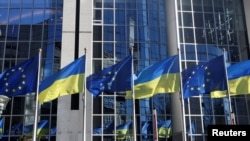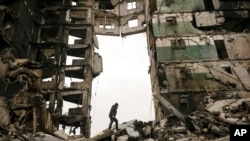The European Union is expected to join the United States in imposing new sanctions against Russia as horrific reports of possible war crimes in Ukraine continue to surface. But critics, including some EU members, are calling the measures insufficient.
The new EU sanctions — the fifth round by the bloc since Russia invaded Ukraine — are expected to target Russian coal, shipping and banking sectors, including Russia’s largest lender Sverbank, which says the move will be insignificant on its operations.
In a video address to the Irish parliament, Ukrainian President Volodymyr Zelenskyy called the EU indecisive for not adopting stronger measures to bar Russian energy imports.
Calls for tougher energy bans also are growing within the EU, including from Baltic states — which ended Russian natural gas imports as of April 1 — and the bloc’s executive arm. That includes European Council President Charles Michel, who addressed the European Parliament on Wednesday.
“Ladies and gentlemen," he said, "I think that measures on oil and even gas will also be needed sooner or later.”
The same message was sent from EU’s foreign policy chief Josep Borrell, who said the EU had paid Russia’s President Vladimir Putin more than $35 billion for energy imports since the war began, compared with only about $1 billion worth of arms and weapons the EU sent to Ukraine.
The 27-member bloc has pledged to cut by two-thirds its Russian gas imports by year’s end, and completely end energy imports from Moscow this decade. But countries like Germany, which is highly dependent on Russian oil and gas, are worried about the economic hit of an immediate and total energy ban.
Hungarian leader Viktor Orban, who won another term in office Sunday and who has nurtured close ties with Russia, is also pushing back against tougher sanctions.
Still, horrific reports of possible Russian war crimes in Ukraine are hardening European mindsets. This week, more EU countries expelled dozens of Russian officials from their soil. Some member states also are sending their diplomats back to Ukraine, who left after Russia’s invasion six weeks ago.
On Tuesday, French prosecutors opened three probes into alleged war crimes for activities they said likely had been committed in Ukraine against French nationals.
Interviewed by French radio, President Emmanuel Macron of France, which currently holds the rotating EU presidency, said there are clear indications that war crimes were committed in Ukraine, likely perpetrated by Russia’s army. He said international justice must be served and perpetrators held responsible.
Still, Macron has maintained an open dialogue with Russian President Vladimir Putin to try to find a diplomatic solution to the conflict. That has been criticized by EU member state Poland, which compares Putin to Hitler.





